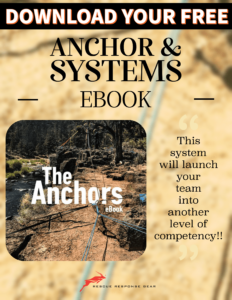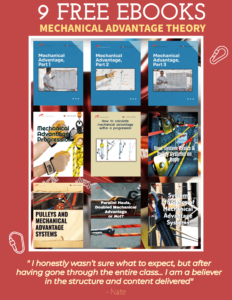Metacognition and GAP in Rope Rescue
Rope rescue and rigging are inherently complex, requiring not only technical skills but also strategic thinking and adaptability. By integrating metacognition with the principles of GAP and GAIN, teams can create a framework that fosters continuous improvement, innovation, and operational excellence.
Metacognition in Rope Rescue
Metacognition, or “thinking about thinking,” is a vital skill for rope rescue technicians. It involves three critical phases: planning, monitoring, and evaluating. By developing metacognitive skills, rescuers can anticipate challenges, adapt to unexpected situations, and learn from their experiences.
Applying Metacognition in Rescue Scenarios
When setting up a complex system, such as a two-tension rope system (TTRS) with a dynamic directional, metacognitive strategies play a pivotal role:
- Planning:
- Assess the environment (e.g., platforms, elevation, available anchors).
- Develop a clear strategy based on the team’s skills and available resources.
- Anticipate potential risks and equipment limitations.
- Monitoring:
- Observe the system setup, ensuring adherence to safety standards.
- Identify and address challenges, such as unstable anchor points or misaligned pulleys.
- Communicate with team members to ensure synchronization.
- Evaluating:
- Test the system’s functionality and stability.
- Reflect on what worked well and what could be improved.
- Document insights for future rescues.
Metacognition not only enhances decision-making but also boosts confidence, ensuring that every team member understands their role and responsibilities.
Bridging the GAP and Achieving the GAIN
The concepts of GAP and GAIN offer a powerful framework for identifying areas of improvement and celebrating progress in rope rescue operations.
Understanding the GAP
The GAP represents the space between current capabilities and the ideal state. For rope rescue teams, this might include:
- Recognizing skill deficits, such as limited experience with advanced rigging systems.
- Identifying knowledge gaps about emerging techniques, like twin-tension systems.
- Understanding equipment limitations and exploring opportunities for upgrades.
By analyzing the GAP, teams can prioritize training, acquire new tools, and refine strategies to align with evolving rescue demands.
Focusing on the GAIN
The GAIN emphasizes progress and achievements, fostering motivation and resilience. Key ways to highlight the GAIN include:
- Reflecting on successful missions that demonstrated improved techniques.
- Celebrating team milestones, such as mastering a new rigging system or completing a complex scenario during training.
- Tracking individual and team growth in problem-solving, creativity, and cooperation.
This dual focus on the GAP and GAIN ensures that teams remain forward-looking while acknowledging the value of their efforts.
The Role of Creativity, Innovation, and Cooperation
Rope rescue demands a combination of technical precision and creative problem-solving. Creativity, innovation, and cooperation are the cornerstones of successful operations:
- Creativity:
- Crafting solutions for unique challenges, such as rescues in confined spaces or unstable environments.
- Adapting standard systems to fit unconventional scenarios.
- Innovation:
- Embracing advancements in equipment, such as the Petzl ASAP Lock for fall protection or twin-tension systems for redundancy.
- Developing new techniques, like integrating progress capture devices with lightweight pulley systems.
- Cooperation:
- Ensuring seamless communication and trust among team members.
- Leveraging diverse skills and perspectives to enhance decision-making.
When these elements work together, teams can navigate even the most challenging rescue scenarios with confidence and efficiency.
Applying the 6 Filtering Questions to Rope Rescue
The 6 Filtering Questions offer a structured way to evaluate new techniques, equipment, and strategies:
- Does it align with our values?
- Prioritize safety, efficiency, and reliability in all operations.
- Does it enhance our unique abilities?
- Adopt tools and methods that improve team capabilities and adaptability.
- How does it benefit the rescue mission?
- Assess the potential to improve outcomes for victims and rescuers alike.
- Is it financially viable?
- Ensure that investments in equipment or training provide measurable returns.
- Does it have transformational potential?
- Evaluate whether it can drive long-term improvements in team performance and safety.
- What is the opportunity cost?
- Consider what resources or priorities might need to be sacrificed to implement the change.
These questions help rescue teams make informed decisions, balancing immediate needs with strategic goals.
Practical Integration: GAP, GAIN, and Metacognition in Action
Consider a scenario where a team is tasked with rescuing an injured climber from a narrow canyon. Here’s how these principles come into play:
- Assess the GAP:
- Recognize that the team lacks experience with confined space rigging.
- Identify a need for additional progress capture devices to enhance safety.
- Plan and Monitor:
- Develop a step-by-step approach using TTRS for redundancy.
- Adjust the plan as the team encounters unstable anchors or shifting terrain.
- Celebrate the GAIN:
- Reflect on the successful implementation of a new technique.
- Acknowledge the team’s adaptability and problem-solving efforts.
- Use Creativity and Innovation:
- Adapt a lightweight pulley system to minimize the load on unstable anchors.
- Introduce a dynamic directional to improve rope management.
- Apply Filtering Questions:
- Evaluate the long-term benefits of adopting TTRS and determine whether it should become standard practice.
Conclusion
Integrating metacognition, GAP, and GAIN into rope rescue operations creates a culture of continuous learning and improvement. By fostering self-awareness, celebrating progress, and embracing innovation, teams can tackle complex challenges with greater confidence and efficiency.
For further insights and training, explore Rigging Lab Academy’s Courses, where you can deepen your understanding of advanced techniques and equipment. Remember, every challenge presents an opportunity to learn, grow, and enhance the safety and effectiveness of your rescue
Peace on your Days
Lance









